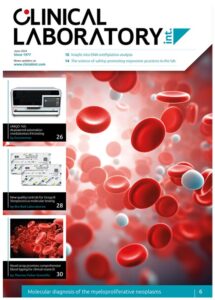Towards earlier detection of ovarian cancer?
According to Cancer Research UK, the incidence of ovarian cancer in the UK is around 7500 new cases per year, accounting for 4% of all new cancer cases in females. The overall 5-year survival rate is around 46%, dropping to 35% at the 10-year mark, a relatively poor prognosis, but almost double that of 40 years ago. These aggregated statistics hide a more complicated story and, as is often the case, diagnosis at an early stage leads to markedly better survival figures (90% survival for patients diagnosed at stage 1). However, one of the reasons for the poor prognosis is that ovarian cancer is often diagnosed at stage 3 or 4 (22% survival), which is likely to be the result of the rather vague and non-specific nature of symptoms in the early stages. Recent screening trials based on the detection of sudden increases in CA-125 level and ultrasound have shown slight improvements in diagnosis at an earlier stage but no significant reduction in mortality. A recent paper by Russell et al.*, however, demonstrated that use of a panel of four biomarkers results in the potential to diagnose ovarian cancer up to 2 years earlier than current tests can. The four biomarkers included in the panel were identified from serum samples collected in a time span up to 7 years before diagnosis (obtained from one of the screening trials mentioned earlier), which is likely to be the window in which early, treatable, asymptomatic disease occurs. The biomarkers used were ovarian cancer-related tumour marker CA125 (CA-125), vitamin K-dependent protein Z (PROZ), phosphatidylcholine-sterol acyltransferase (LCAT) and C-reactive protein (CRP) and dysregulation against baseline was calculated, with specificity thresholds for dysregulation set from control data. The authors, however, outline and discuss a number of limitations and caveats that mean that they are not suggesting that this biomarker panel is ready to be rolled out in a screening programme, but that the potential is there to warrant a larger scale study. This paper not only demonstrates a real step forward in the early detection of ovarian cancer but also very eruditely describes what is needed from biomarkers and a screening programme that is intended to identify early disease and is worth reading for that alone.
* Russel MR, et al. Diagnosis of epithelial ovarian cancer using a combined protein biomarker panel. Br J Cancer 2019; doi: 10.1038/s41416-019-0544-0.



